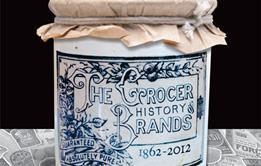In the so-called roaring 1920s, Britain got back to business.
Plans developed by Wall’s in 1913 to move into ice cream to help offset the quiet summer months, when sales of its pies and sausages dipped, had been frustrated by the Great War. The plans were revived in 1922 (though by this time Wall’s was owned by Lever Bros), with Lyons Maid launching three years later.
The 1920s was an age of excitement, of technological innovation. In a seminal moment for the grocery trade, in 1924 Frigidaire began to market fridges in Britain - good news for chilled grocery brands such as Viking (1927), the first vitamin-enriched margarine. Air travel, meanwhile, was taking off, and the first transatlantic telephone call was made in January 1927.
Above all, the 1920s was the age of entertainment. The BBC was formed in October 1922. The Radio Times arrived in 1923. Cinema was all the rage - over the course of the decade, the transition from silent films to ‘talkies’ brought people to cinemas in droves, opening up a new advertising medium to grocery brands.
And the brands launched in the 1920s were no less luminary: Kenco (1923), Brylcreem (1928), Durex (1929), Fyffes (1929), as well as impulse brands Smith’s crisps (1920), Star Cigarettes (1923), Fry’s Crunchies (1929) and Lucozade (1929).
These treats no doubt helped distract from post-war depression. For the road to recovery was, in truth, anything but easy: there was mass unemployment as servicemen returned home, and mass emigration, too, as many sought a better life in the New World. In April 1921, coal rationing was introduced as a result of the miners’ strike begun in late March. Although that strike ended in June, planned pay reductions sparked another in May 1926, resulting in a general strike in which over 1.5 million people protested in sympathy with the miners.
On the Irish Question, violence was still rife even after separate parliaments were created under the Government of Ireland Act in December 1920. In 1922, the coalition government formed by David Lloyd George in 1916 dissolved. And, of course, there was the Wall Street Crash of 24 October 1929 - and the crash of the London Stock Exchange four days later.
History of Brands

What is a brand? Why do brands exist? Laura Evans lifts the lid on how brands began - and how they’ve changed.
- 1
- 2
- 3
- 4
- 5
- 6
- Currently reading
History of brands: the 1920s
- 8
- 9
- 10
- 11
- 12
- 13
- 14
- 15















No comments yet